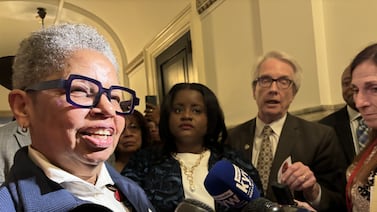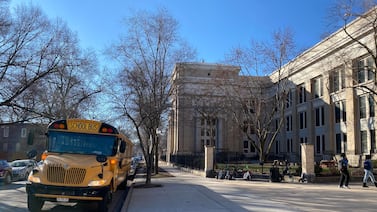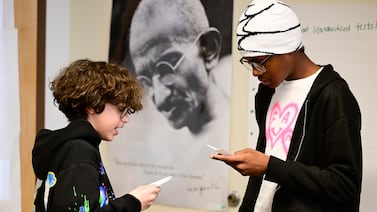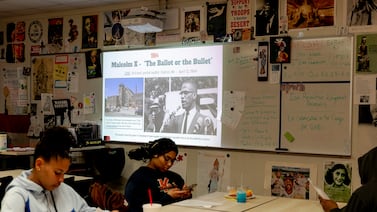Sign up for Chalkbeat Philadelphia’s free newsletter to keep up with the city’s public school system.
Kevin Tellez-Torres thought filling out his financial aid forms for college was a breeze this year.
He didn’t encounter any glitches, and spent a total of maybe 30 minutes on the website filling in his information. ”It was really, like, easy,” Tellez-Torres said.
The issues started after he hit submit. What concerned him was when he heard the federal government was “having trouble delivering it to colleges, or even verifying our information.”
Tellez-Torres, a 19-year-old senior at Horace Furness High School, said it took a month to get his financial aid information to his colleges. That put him up against decision deadlines at some out-of-state schools. Other students have been even less lucky.
Students like Tellez-Torres across the country are finding themselves powerless to make decisions about higher education due to the federal government’s bungled rollout of the new Better Free Application for Federal Student Aid, commonly known as the FAFSA. Students who complete the form are much more likely to attend college. But just 35.2% of Pennsylvania seniors have submitted the FAFSA this year, down more than 22% from the previous academic year, according to data from the National College Attainment Network.
The bad news keeps coming. This week, President Joe Biden’s administration announced that as many as 16% of FAFSA applications require a student correction, and 30% of FAFSA forms are “potentially affected by known processing or data errors.”
The federal government will be reprocessing forms next week, and it will begin sending reprocessed records to schools by May 1. But that’s essentially too late for many Philly students looking to take advantage of Pennsylvania’s state grant money for college.
That’s because the deadline to apply for the state grant is May 1, the date set by the Pennsylvania Higher Education Assistance Agency, or PHEAA. And students need to have their FAFSAs completed and processed by then.
The way the assistance agency hinges on the FAFSA is “an absolute disaster at the moment” said Jonathan Holbert, manager of College and Career Advising for Heights Philadelphia, an education nonprofit that focuses on college and career access for Black, Brown, and first-generation students.
In order to take advantage of this state grant money, Holbert said, students must complete the FAFSA, the federal government must then process it and send that information to the state, which then spends 10 business days processing the FAFSA data. Then the state sends students a link to complete their state grant application.
Yasmeen Mutan, 18, a senior at William W. Bodine High School, said she’s still waiting for her federal financial aid package some four months after submitting her FAFSA documents.
Without knowing how much aid she’ll get, she said she can’t make a decision about what school she wants to attend and can’t apply for state financial aid, given the way the PHEAA’s process works.
“It’s super annoying but what can you do?” Mutan said. “What happens if my FAFSA isn’t completed before May 1st? Do I just go into college without knowing how much I’m going to pay?”
Bethany Coleman, a PHEAA spokesperson, declined to say whether the state is considering pushing back the May 1 deadline because of the known processing delays. Coleman said in an email her office is “watching student application volume and will be providing our Board of Directors with information to consider later this month.”
Colleges are adjusting how they send out financial aid awards because of the FAFSA delays. Ron Ozio, a spokesperson for The University of Pennsylvania, said in an email Penn students won’t be impacted. Ozio said Penn supplements students with institutional aid “until we receive FAFSA data,” at which point they can “swap in any federal aid.” But not every school has the same financial flexibility.
Holbert said students and teachers frequently ask him what they can do about issues filling out the FAFSA and he said he has to tell them: “Nothing. We have to wait until they fix it.”
He said students all over the city are experiencing anxiety and grappling with the feeling that they have no control over their postsecondary options. And unlike in previous years, Holbert also said, there is no support for students from the federal government.
“In the past you could have some success calling and getting some help,” Holbert said. “but this year it’s a nonstarter. There’s no point. We’re not advising students to reach out. It’s a waste of time, they’re just gonna tell them it’s a glitch and they have to wait anyway.”
FAFSA events and counseling hit stumbling blocks
Madeline Birkner, senior manager of postsecondary persistence at the Philadelphia Education Fund, an education nonprofit, said she’s trying to remain positive with students to keep them optimistic.
Birkner said the most glaring problem this year is “this feeling of a lack of urgency” from Philly seniors, “because the deadlines have been so messy, because the messaging isn’t consistent, or sometimes it’s not accurate.”
Students are told to “just fill out your FAFSA” she said, but then “they actually can’t in some cases.”
“Hearing how important FAFSA is, that it’s the first step of college, but then it actually isn’t functioning the way you’re being told it should, it undermines the sense that this is worth doing,” Birkner said.
Birkner also said Philly schools and organizations like hers have had a hard time scheduling larger “FAFSA completion” events because they’re not sure students will actually be able to complete the FAFSA onsite.
Kelsey Smith, a college access coordinator from the Philadelphia Education Fund stationed at Furness High School who worked with Tellez-Torres on his application, said even when students do everything right and have all of their documents prepared ahead of time, it can take five or six counseling sessions to submit a student’s FAFSA.
And with Philly’s chronic absenteeism challenges, Smith said she can’t guarantee every student will stick through those multiple sessions.
Despite the messy rollout, Birkner and Smith said the Better FAFSA may actually be better one day. Just not today.
“I’m really optimistic that in the future, this will matter,” Birkner said. “All these changes, these growing pains, will actually matter for the most disadvantaged students.”
Carly Sitrin is the bureau chief for Chalkbeat Philadelphia. Contact Carly at csitrin@chalkbeat.org.







